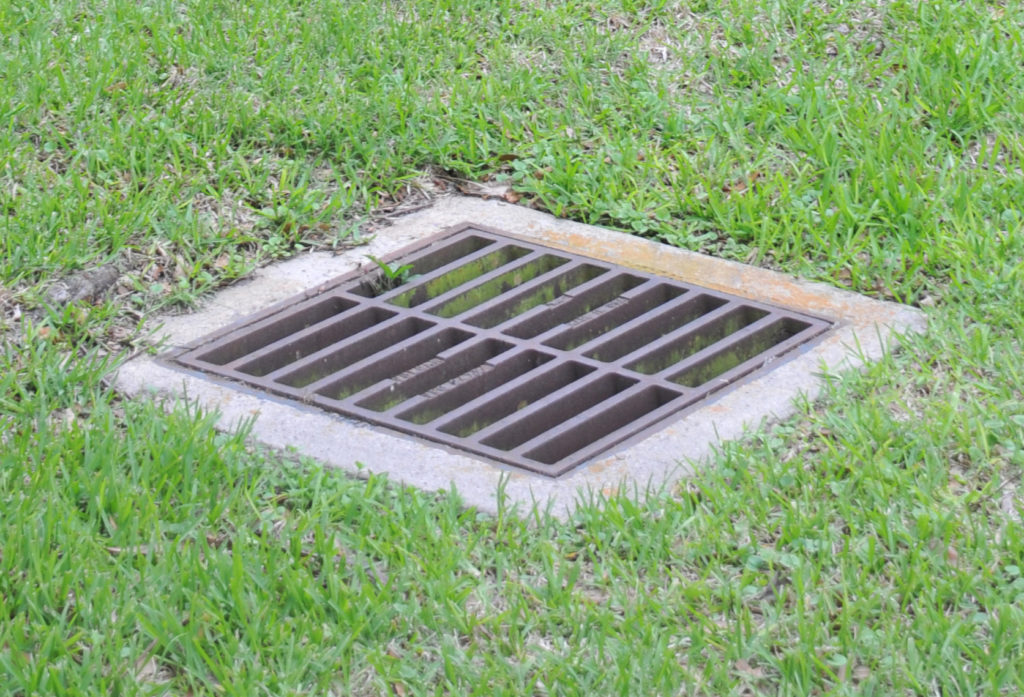Resilience Treatments & Strategies
Stormwater Control

Description
Refers to the management of stormwater runoff. The purpose is to minimize your site’s contribution to flooding and pollution. Systems designed to control stormwater can include active systems (e.g., engineered containment systems) or passive systems (e.g., berms). The system needs to be sized by an engineer to handle the anticipated volume of stormwater.
Typical risk factor of this component:
Moderate
Stormwater control systems are typically appropriately sized to handle the anticipated volume of stormwater, so likelihood of failure is low. However, the impact a failure could have on the building’s condition is high.
Typical Damages from Floods or Hurricanes
- Stormwater control system inlets are blocked by debris, impairing functionality and causing ponding
Other common conditions contributing to vulnerability towards floods or hurricanes
- Stormwater control system is undersized to handle the amount of water for storms in the area
- Lack of integration between building roof drainage and site drainage systems
Resilience Treatments and Strategies
In-house
Maintain (keep debris clear from) drain grilles, culvert mouths, drainage channels, etc. (see also NPS Preservation Brief #47). Ensure they are properly connected to the broader stormwater control system.
Maximize permeable surfaces in the landscaping, rather than impermeable surfaces.
Consider adding detention ponds, rain gardens, rainwater tanks, or other such water control strategies to landscaping.
Check regularly for water collection after rain events. Even small rain events can reveal problems that can be devastating in a more severe rain event.
Professional needed [type]
- Install a subgrade drainage system (e.g., French drain) that connects to a broader stormwater control system [landscape architect or civil engineer].
Stormwater Control

Description
Refers to the management of stormwater runoff. The purpose is to minimize your site’s contribution to flooding and pollution. Systems designed to control stormwater can include active systems (e.g., engineered containment systems) or passive systems (e.g., berms). The system needs to be sized by an engineer to handle the anticipated volume of stormwater.
Typical risk factor of this component:
Moderate
Stormwater control systems are typically appropriately sized to handle the anticipated volume of stormwater, so likelihood of failure is low. However, the impact a failure could have on the building’s condition is high.
Typical Damages from Floods or Hurricanes
- Stormwater control system inlets are blocked by debris, impairing functionality and causing ponding
Other common conditions contributing to vulnerability towards floods or hurricanes
- Stormwater control system is undersized to handle the amount of water for storms in the area
- Lack of integration between building roof drainage and site drainage systems
Resilience Treatments and Strategies
In-house
Maintain (keep debris clear from) drain grilles, culvert mouths, drainage channels, etc. (see also NPS Preservation Brief #47). Ensure they are properly connected to the broader stormwater control system.
Maximize permeable surfaces in the landscaping, rather than impermeable surfaces.
Consider adding detention ponds, rain gardens, rainwater tanks, or other such water control strategies to landscaping.
Check regularly for water collection after rain events. Even small rain events can reveal problems that can be devastating in a more severe rain event.
Professional needed [type]
- Install a subgrade drainage system (e.g., French drain) that connects to a broader stormwater control system [landscape architect or civil engineer].